Region Choice Overview
Number of Schools in the Region
Elementary Schools
High Schools
Options School
Elementary School Attendance Boundaries in the Region
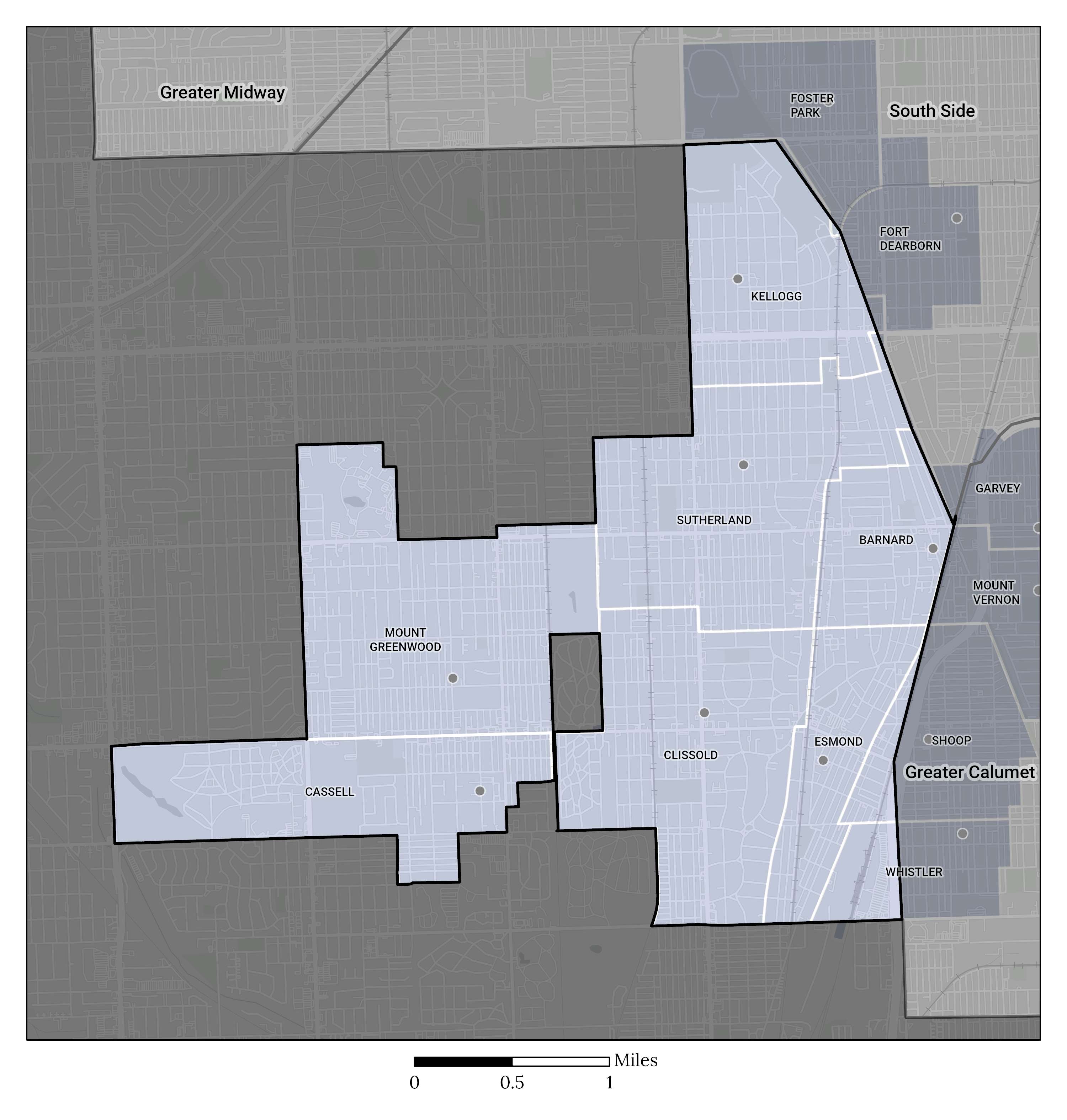
Elementary School Attendance Boundaries
NOTE: Schools in the region without attendance boundaries (citywide schools) are not shown on the attendance boundary map. Citywide schools do not have attendance boundaries and admit students through an application process.
CPS has some middle schools that serve a subset of grades K-8. Middle schools may have a dedicated attendance boundary. Only stand-alone middle schools that are not contained within an elementary school are included on this map. For more information on middle schools, use the CPS School Locator at schoolinfo.cps.edu/schoollocator/index.html to understand which schools an address is zoned to.
High School Attendance Boundaries in the Region
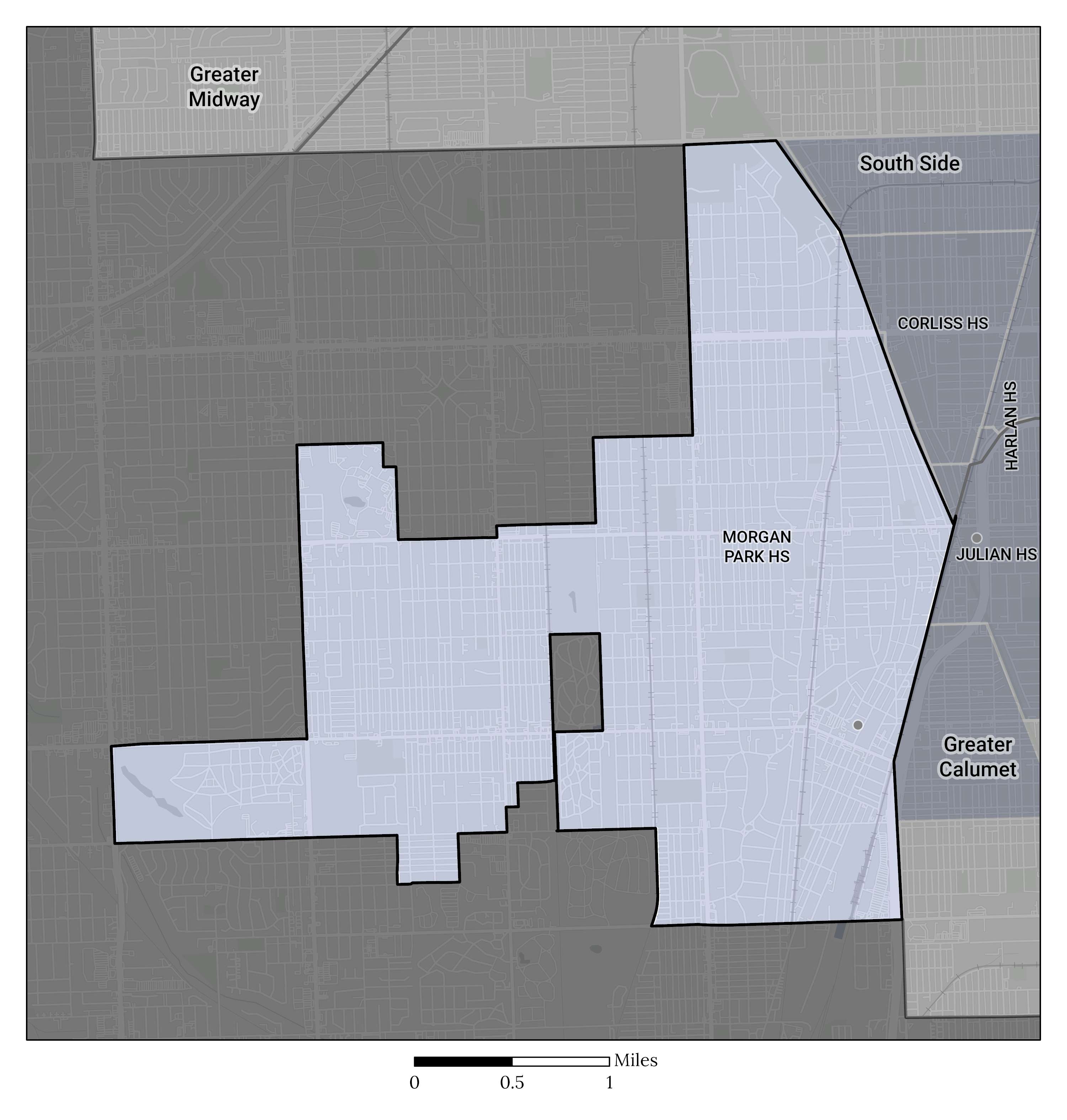
High School Attendance Boundaries
NOTE: Schools in the region without attendance boundaries (citywide schools) are not shown on the attendance boundary map. Citywide schools do not have attendance boundaries and admit students through an application process.
Options High Schools do not have attendance boundaries and students can choose to attend any Options high school within or outside of their home region.
Choice Patterns in the Region
Choice In
Students that live outside of the region and attend schools in the region
Choice Out
Students that live in the region but attend schools outside the region
Reside & Attend
Students that both reside and attend schools in the region
Enrollment by School Governance Type in the Region
NOTE: Enrollment data is for students that attend school within the region, regardless of where they reside.
Charter, Contract, and Alternative Learning Opportunity Program (ALOP) schools are public schools managed by independent operators and authorized by CPS. ALOP schools are a specific type of Options High School designed to provide educational support for students who face challenges to successfully graduating from a traditional high school.
Are Elementary Students Choosing Schools in the Region?
Elementary School Student Choice Over Time
School choice is currently defined as choosing to attend a school that is not a student’s zoned (or assigned) school.
Over the past four years, in this region, the percent of elementary school students attending a school other than their zoned school (in or out of the region) has increased from 21% to 23%. In the same time frame, the percentage of students attending their zoned school has decreased from 79% to 77%.
The percentage of elementary school students attending a school in the Far Southwest Side region (zoned or non-zoned) has remained relatively the same at 86%, while the percentage of students attending another school out of the region has remained relatively the same at 14%.
Elementary School Student Attendance Type Over Time
Elementary School Student Attendance Type Over Time
NOTE: Only K-8 grade students are included in school choice calculations as Pre-K students are not zoned to a school. Due to rounding, some charts may not add up to 100%.
Elementary School Students Who Attend School Out of Region by Race/Ethnicity
Of the 3,637 elementary students who live in the region, 14% (513 students) attend school outside of the region. Of those 513 students, 4% of students who identify as White attend school outside of their home region compared to 25% of students who identify as Black and 11% of students who identify as Latinx.
Elementary School Students Attending School Out of Region by Race/Ethnicity
Elementary School Students Attending School Out of Region by Race/Ethnicity
NOTE: Due to rounding, some charts may not add up to 100%.
Elementary School Students Who Attend a Non-Zoned School In Region
Of the 3,637 elementary students residing in the region, 9% (309 students) attend another school in the region that is not their zoned school. Of those 309 students, 68% attend a zoned school other than their own with the remainder attending selective enrollment or choice programs in the region.
School Type of Elementary School Students Attending a Non-Zoned School In Region
School Type of Elementary School Students Attending a Non-Zoned School In Region
Elementary School Students Who Attend a Non-Zoned School Out of Region
Of the 3,637 elementary students residing in the region, 14% (513 students) attend another school out of the region. Of those 513 students, 48% attend selective enrollment or choice programs with the remainder attending a zoned school in another region, Charter/Contract schools, or other citywide schools out of the region.
School Type of Elementary School Students Attending a School Out of Region
School Type of Elementary School Students Attending a School Out of Region
Elementary School Student's Distance and Time Traveled to School
Of the 3,637 elementary students residing in the region, 71% travel less than 1 mile for school and 14% travel 3 miles or more. 54% of students travel less than 15 minutes and 8% travel 45 minutes or more.
Travel data can be helpful in understanding the overall choice patterns for the region. In general, shorter commutes can indicate that more or better school options are available within the region while longer commutes may mean that students are opting to travel greater distances to their school of choice.
Elementary School Students
Distance Traveled to School
Region median: 0.7 mi.
District median: 0.5 mi.
Elementary School Students
Time Traveled to School
Region median: 14 min.
District median: 12 min.
Elementary School Students Distance Traveled to School
Elementary School Students Time Traveled to School
NOTE: The travel distance and time medians represent the midpoint in each group of data. The midpoint is the point where 50% of students in the region travel shorter than this distance/time and 50% travel longer than this distance/time. Using a median more fairly represents travel data and reduces the influence of extreme values such as students who attend school very far away from their home region.
Distance traveled and commute time are calculated based on the student’s home address and the address of their school. Commute distance and time was calculated using Google Maps travel estimates and includes a combination of walking and public transit data. The analysis takes into account school start times and chooses routes that minimize unnecessary travel and wait time. Any wait time before a trip starts is not included but wait times due to transfers are included.
Due to rounding, some charts may not add up to 100%.
Where are Elementary Students Choosing to Attend Outside the Region?
This map illustrates the current choice footprint of K-8th graders residing in the Far Southwest Side region but attending a school out of the region.
The South Side, Bronzeville / South Lakefront, and Greater Calumet regions are enrolling the greatest overall number of elementary students who reside in the Far Southwest Side region but attend school out of the region.
Elementary School Choice Footprint Map
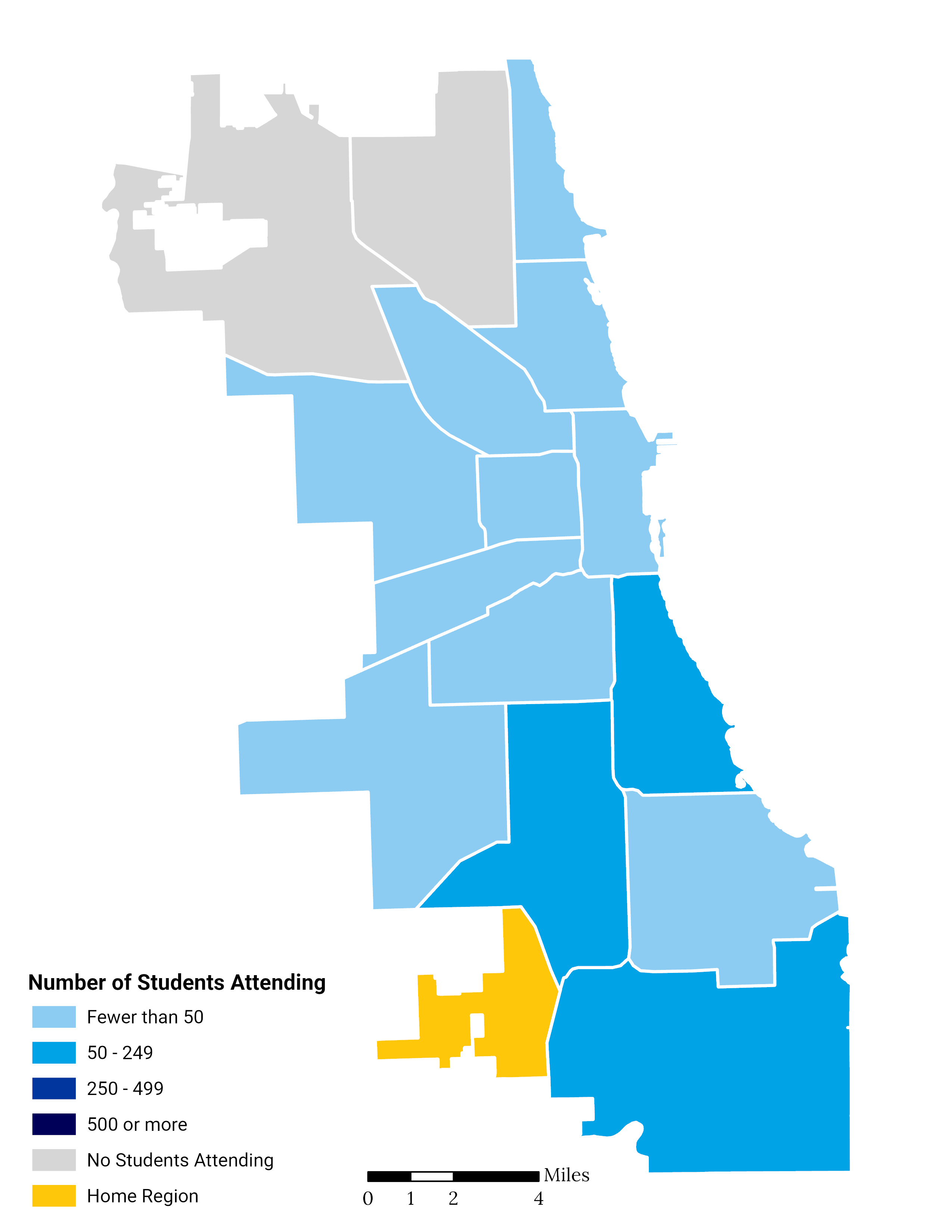
Are High School Students Choosing Schools in the Region?
Percentage of 8th Grade Students in the Region Who Applied to High School
Since 2017-18, CPS has utilized the GoCPS platform to allow students to research and apply to all high schools and high school programs. Students are asked to rank in order of preference the schools and programs they are most interested in. Students are still guaranteed a seat in the general education program at their zoned high school and do not have to submit a GoCPS application for that program. For more information about GoCPS and the high school application process, visit go.cps.edu.
In the Far Southwest Side region, 85% (339) of 8th-grade students applied to a variety of high school programs in Round 1 of the GoCPS application process. This is less than than the district rate of 92%.
Percent of 8th Grade Students in the Region Who Applied to High School
Percent of 8th Grade Students in the Region Who Applied to High School
Percentage of Students in the Region Who Received an Offer from One of Their Top 3 Choices
Of the 8th-grade students residing in the Far Southwest Side region who applied in Round 1, 83% received an offer to one of their top 3 choices of high school programs. This is less than the district rate of 87%.
This data does not include selective enrollment high schools as those schools use a different ranking process in GoCPS.
Percent of 8th Grade Students in the Region Who Received an Offer from One of Their Top 3 Choices
Percent of 8th Grade Students in the Region Who Received an Offer from One of Their Top 3 Choices
NOTE: This analysis only includes 8th-grade applicants who were enrolled on the 20th day of school in 2024-25. Due to rounding, some charts may not add up to 100%.
Between school years 2020-21 and 2021-22 changes were made to the CPS HS admissions process. As a result, students' ranking and offer outcomes will differ overall from previous years' data.
High School Student Choice Over Time
School choice is currently defined as attending a school that is not a student’s zoned (or assigned) school.
Over the past four years, in this region, the percent of high school students attending a school other than their zoned school (in or out of the region) has decreased from 78% to 74%. In the same time frame, the percentage of students attending their zoned school has increased from 22% to 26%.
High school students attending a school in the Far Southwest Side region (zoned or non-zoned) has increased from 55% to 58%, while students attending another school out of the region has decreased from 45% to 42%.
High School Student Attendance Type Over Time
High School Student Attendance Type Over Time
NOTE: Due to rounding, some charts may not add up to 100%.
High School Students Who Attend School Out of Region by Race/Ethnicity
Of the 1,125 high students who live in the region, 42% (476 students) attend school outside of the region. Of those 476 students, 46% of students who identify as Black attend school outside of their home region compared to 35% of students who identify as White and 35% of students who identify as Latinx.
High School Students Attending School Out of Region by Race/Ethnicity
High School Students Attending School Out of Region by Race/Ethnicity
NOTE: Due to rounding, some charts may not add up to 100%.
High School Students Who Attend a Non-Zoned School In Region
Of the 1,125 high students residing in the region, 32% (356 students) attend another school in the region that is not their zoned school. Of those 356 students, 100% attend selective enrollment or choice programs in the region.
School Type of High School Students Attending a Non-Zoned School In Region
School Type of High School Students Attending a Non-Zoned School In Region
High School Students Who Attend a Non-Zoned School Out of Region
Of the 1,125 high students residing in the region, 42% (476 students) attend another school out of the region. Of those 476 students, 67% attend selective enrollment or choice programs with the remainder attending Charter/Contract schools, other citywide schools, or a zoned school out of the region.
School Type of High School Students Attending a School Out of Region
School Type of High School Students Attending a School Out of Region
High School Student's Distance and Time Traveled to School
Of the 1,125 high students residing in the region, 46% travel less than 3 miles for school and 31% travel 6 miles or more. 53% of students travel less than 30 minutes and 28% travel 45 minutes or more.
Travel data can be helpful in understanding the overall choice patterns for the region. In general, shorter commutes can indicate that more or better school options are available within the region while longer commutes may mean that students are opting to travel greater distances to their school of choice.
High School Students
Distance Traveled to School
Region median: 3.2 mi.
District median: 2.6 mi.
High School Students
Time Traveled to School
Region median: 28 min.
District median: 26 min.
High School Students Distance Traveled to School
High School Students Time Traveled to School
NOTE: The travel distance and time medians represent the midpoint in each group of data. The midpoint is the point where 50% of students in the region travel shorter than this distance/time and 50% travel longer than this distance/time. Using a median more fairly represents travel data and reduces the influence of extreme values such as students who attend school very far away from their home region.
Distance traveled and commute time are calculated based on the student’s home address and the address of their school. Commute distance and time was calculated using Google Maps travel estimates and includes a combination of walking and public transit data. The analysis takes into account school start times and chooses routes that minimize unnecessary travel and wait time. Any wait time before a trip starts is not included but wait times due to transfers are included.
Due to rounding, some charts may not add up to 100%.
Where are High School Students Choosing to Attend Outside the Region?
Choice Footprint Map
This map illustrates the current choice footprint of 9th-12th graders residing in the Far Southwest Side region but attending a school out of the region.
The Central Area, Bronzeville / South Lakefront, South Side, and Greater Calumet regions are enrolling the greatest overall number of high school students who reside in the Far Southwest Side region but attend school out of the region.
High School Choice Footprint Map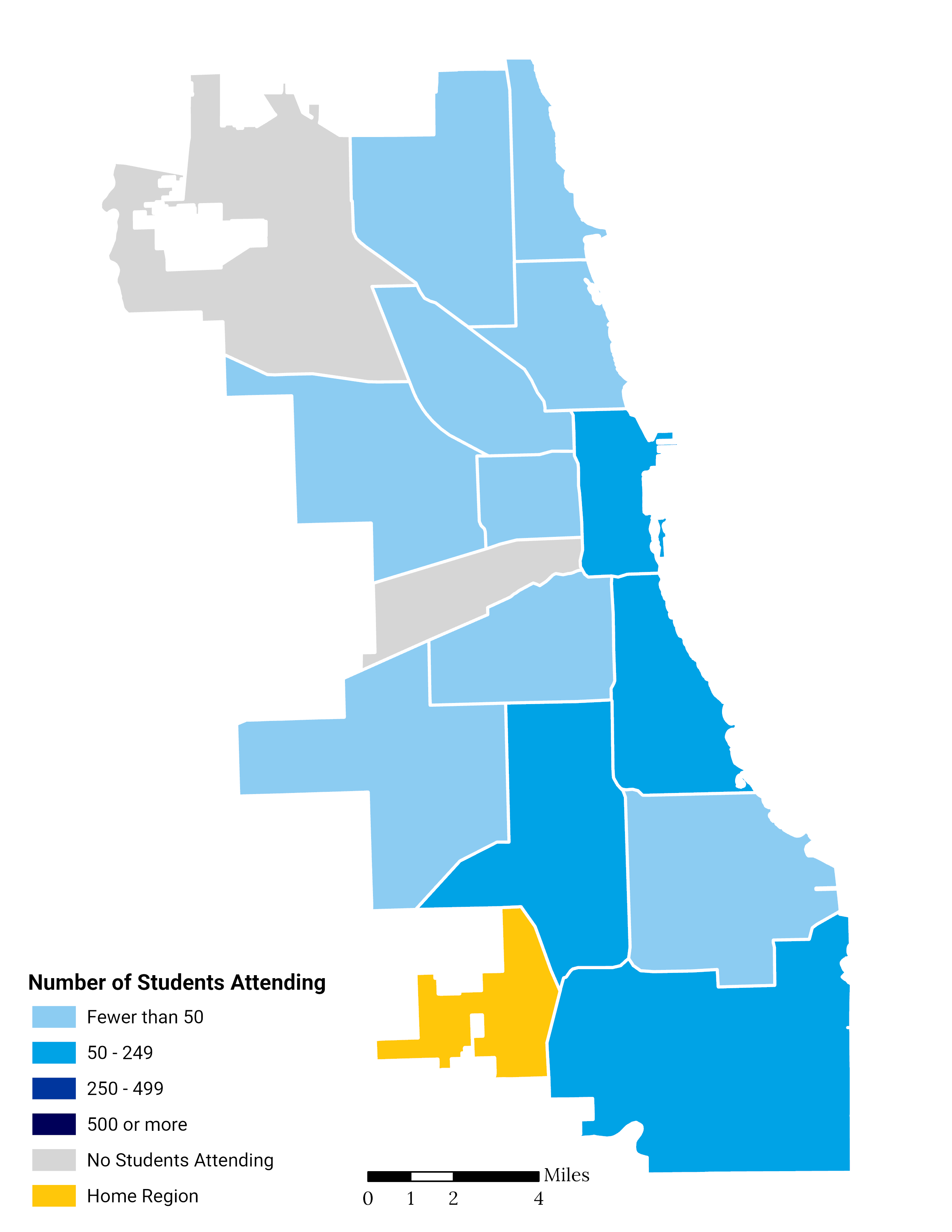
Are Options High School Students Choosing Schools in the Region?
Options High School Student Choice Over Time
Options high schools serve students who need a new pathway toward high school graduation. CPS schools offer additional supports and services for students who have been out of school and seek to return or who may need opportunities to earn credits in an accelerated program. Some of CPS’ campuses offer additional supports such as counseling and alternative schedules for students who may work during the traditional school day.
Options high schools exist in every region except the Greater Lincoln Park and Far Southwest Side regions. Options high schools do not have attendance zones or admission criteria although many serve only students 16 years and older. Students can choose to attend any Options high school within or outside of their home region. For this reason, Choice patterns tend to differ for Options students compared to elementary and other high school students.
Over the past four years, the percentage of Far Southwest Side Options high school students attending a school out of the region has remained at 100% as there are no Options high schools in the region. District-wide, Option high school students attend school out of region at a greater rate than elementary and other high school students.
Options High School Student Attendance Type Over Time
Options High School Student Attendance Type Over Time
NOTE: Due to rounding, some charts may not add up to 100%.
Options High School Student's Distance Traveled to School
The median travel distance for Options high school students residing in the region is 2.2 miles to school, which is 1.2 miles less than the district median. Of the 50 Options high school students in the region, 56% travel less than 3 miles and 10% travel 6 miles or more.
Travel data can be helpful in understanding the overall choice patterns for the region. In general, shorter commutes can indicate that more or better school options are available within the region while longer commutes may mean that students are opting to travel greater distances to their school of choice.
Options High School Students Distance Traveled to School
Region median: 2.2 mi.
District median: 3.4 mi.
Options High School Students Distance Traveled to School
NOTE: The travel distance and time medians represent the midpoint in each group of data. The midpoint is the point where 50% of students in the region travel shorter than this distance/time and 50% travel longer than this distance/time. Using a median more fairly represents travel data and reduces the influence of extreme values such as students who attend school very far away from their home region.
Distance traveled and commute time are calculated based on the student’s home address and the address of their school. Commute distance and time was calculated using Google Maps travel estimates and includes a combination of walking and public transit data. The analysis takes into account school start times and chooses routes that minimize unnecessary travel and wait time. Any wait time before a trip starts is not included but wait times due to transfers are included.
Due to rounding, some charts may not add up to 100%.
Options High School Student's Time Traveled to School
The median travel time for Options high school students residing in the region is 22 minutes, which is 7 minutes less than the district median. Of the 50 Option high school students in the region, 64% travel less than 30 minutes and 16% travel 45 minutes or more.
Travel data can be helpful in understanding the overall choice patterns for the region. In general, shorter commutes can indicate that more or better school options are available within the region while longer commutes may mean that students are opting to travel greater distances to their school of choice.
Options High School Students Time Traveled to School
Region median: 22 min.
District median: 29 min.
Options High School Students Time Traveled to School
NOTE: The travel distance and time medians represent the midpoint in each group of data. The midpoint is the point where 50% of students in the region travel shorter than this distance/time and 50% travel longer than this distance/time. Using a median more fairly represents travel data and reduces the influence of extreme values such as students who attend school very far away from their home region.
Distance traveled and commute time are calculated based on the student’s home address and the address of their school. Commute distance and time was calculated using Google Maps travel estimates and includes a combination of walking and public transit data. The analysis takes into account school start times and chooses routes that minimize unnecessary travel and wait time. Any wait time before a trip starts is not included but wait times due to transfers are included.
Due to rounding, some charts may not add up to 100%.
Where are Options High School Students Choosing to Attend Outside the Region?
Choice Footprint Map and Table
This map illustrates the current choice footprint of 9th-12th Options high school students residing in the Far Southwest Side region. The table shares enrollment data on Options high schools students across all regions.
The Greater Calumet region is enrolling the greatest overall number of Options high school students who reside in the Far Southwest Side region but attend school out of the region.
Options high schools exist in every region except the Far Southwest Side and Greater Lincoln Park regions. Options high school students residing in the Far Southwest Side region must travel out of the region to enroll in an Options high school.
Map of Options High School Locations and
Where Options High School Students Reside and Attend
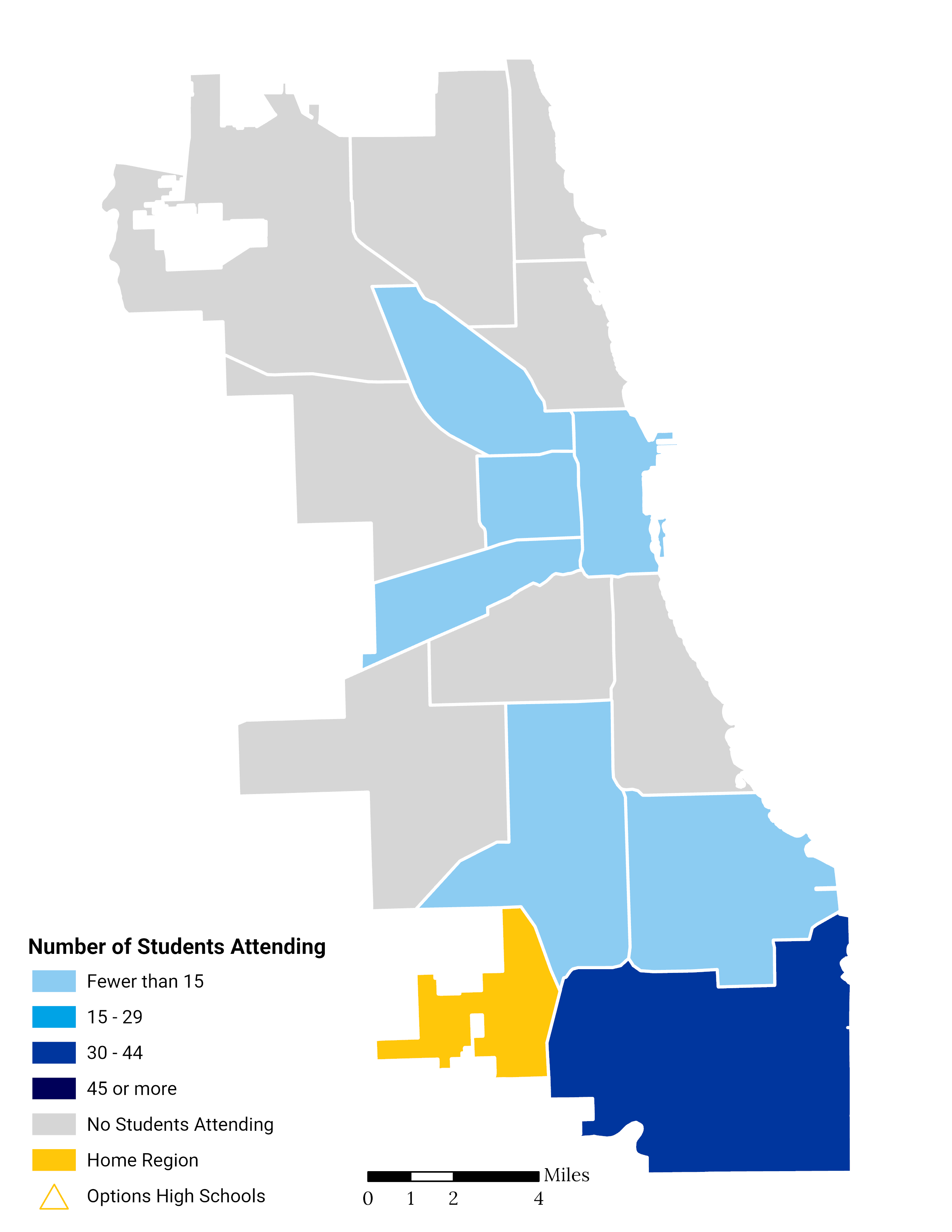
NOTE: Share of Options high school students by region is provided to show the proportion of HS students who attend an Options high school compared to all HS students who reside in that region.
Options high school students can attend school in or out of the region except for in the Far Southwest Side and Greater Lincoln Park regions which do not contain Options high schools.
Options high schools do not have attendance zones or admission criteria although many serve only students 16 years and older.
Options High School Students
